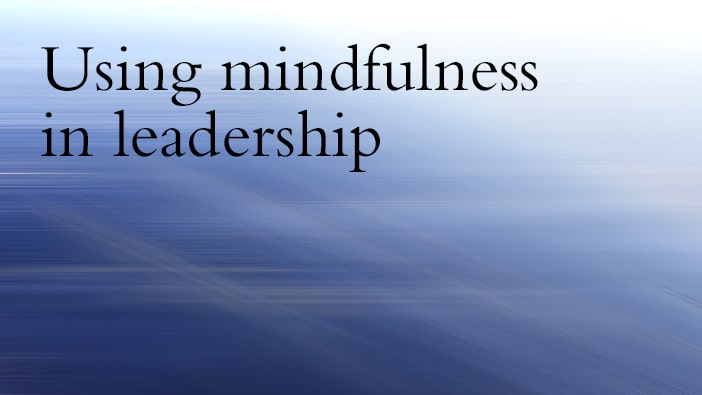Written by Katie Reynolds, a Hult contributing blogger.
The trend for mindfulness is clearly on the rise, with apps, self-help books, and courses all available to help you harness the power of mindfulness to lead a more peaceful, productive life. Mindfulness practice involves focused breathing and meditation techniques, encouraging you to pay attention purposefully in the present moment and become more aware of yourself, your feelings, and your environment.
In today’s volatile business environment and time-poor working culture, mindfulness practice is becoming increasingly relevant for professionals. A research team at Hult International Business School, led by Ashridge Executive Education Associate Professor Dr. Megan Reitz, has undertaken a pioneering study to examine how mindfulness training and practice can influence individuals in leadership positions. Rather than a passing fad, Dr. Reitz’s findings suggest that the practice of mindfulness can indeed be a powerful tool to help individuals lead more effectively.
[Tweet “Rather than a passing fad, mindfulness can be a powerful tool.”]
This article summarizes the three key leadership capabilities that mindfulness practice can help to develop: resilience, collaboration, and leading in complex situations. To learn more about Dr. Reitz’s findings and discover ways to become more mindful in your own professional and personal life, you can watch her recent webinar below.
- Mindfulness builds resilience
Challenges, setbacks and even failures are inevitable in business. Resilience means having the mental toughness not to let failure mean defeat, allowing you to face adversity, maintain motivation, overcome risks, and recover or adapt quickly. That’s why resilient individuals are seen as more effective leaders.
[Tweet “Resilient individuals are seen as more effective leaders.”]
In Dr. Reitz’s study of 57 professionals across industries, over two-thirds felt that mindfulness training improved their resilience to a “great” or “very great” extent. How? Mindfulness involves metacognition and meta-awareness. That is, the ability to recognize your own thoughts and emotions in the present moment and to step outside of yourself to observe them. This recognition allows valuable mental space for self-reflection and the opportunity to regulate your emotions and choose your response, rather than operating on an “autopilot” gut reaction.
Less stress, greater confidence, and more balanced decision making is the result, putting a mindful leader in a better position to adapt in the moment and be resilient in the face challenges and setbacks.
“Resilience requires emotional regulation—it requires adaptability and it requires perspective.”
Dr. Megan Reitz, Associate Professor of Leadership and Dialogue
- Mindfulness promotes collaboration
In today’s global business environment, collaboration—particularly cross-cultural collaboration—is key for success. To be an effective, collaborative leader requires understanding, empathy, and the ability to take in new perspectives.
The same metacognition that improves resilience can also build the empathy that’s required for meaningful collaboration. By using mindfulness techniques to better recognize and regulate your own thoughts and feelings, you in turn become more aware of what the people around you may be feeling, too. They may be stressed or angry or overwhelmed. Or they may have an idea or solution you might not have otherwise considered.
This awareness can help you to see a situation from someone else’s point of view, putting your own feelings into perspective. Being aware of the feelings of others in your workplace can go far to create understanding and a real human connection that can inspire better teamwork and make you a more motivational leader.
- Mindfulness improves leadership in complex situations
“In the midst of uncertainty and distractions, if you’re able to choose to focus, if you can see a challenge from a number of different perspectives, and if you can regulate your stress levels, you’re likely to be able to lead more productively.”
Dr. Megan Reitz, Associate Professor of Leadership and Dialogue
Resilience and collaboration are two capacities that closely connected to the ability to lead in complex situations. And complexity, volatility, and uncertainty are often the defining qualities of today’s business environment.
Rather than responding emotionally with anxiety, anger, or panic in difficult situations, mindfulness can better equip you to stay calm under pressure and make a conscious choice about your response. Acting decisively and with clarity of thought in challenging circumstances is precisely what’s required for effective leadership.
[Tweet “Mindfulness can better equip you to stay calm under pressure.”]
Empathizing with and being open to the ideas and perspectives of others can also help those in leadership positions to adapt in new or unexpected circumstances, armed with options to choose the best solution.
“One of the most important capacities that leaders today can develop is this ability to step out of automatic pilot and open up a tiny space to choose a response. If you have a space to respond, you’re more likely to regulate your emotions, you’re more likely to empathize with the person that’s in front of you, you’re more likely to prioritize and adapt to the current situation and to choose a response that’s more productive.”
Dr. Megan Reitz, Associate Professor of Leadership and Dialogue
By incorporating regular mindfulness practice, individuals and organizations can better prepare for the demands of business leadership in the 21st century. And with this new understanding, mindfulness training is becoming part of our leadership development curriculum at Hult. Ready to develop your leadership skills?
Find out more about Hult’s business programs.




Grow your leadership capabilities with an MBA in international business at Hult. To learn more, take a look at our blog Why every leader needs a growth mindset, or give your career a boost with our Masters in International Business. Download a brochure or get in touch today to find out how Hult can help you to learn about the business world, the future, and yourself.


